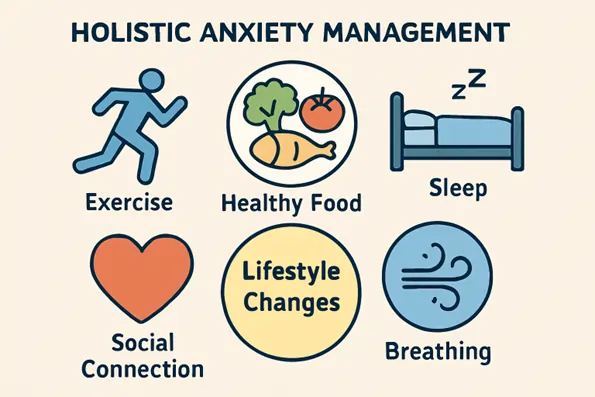Anxiety can impact daily life in ways both subtle and overwhelming, from restless thoughts to physical tension. While professional support and medical approaches are essential, everyday habits and choices influence how well individuals cope with ongoing stress. Developing healthier routines creates a stronger foundation for mental well-being, making it easier to handle challenges as they arise.
Simple adjustments—such as regular exercise, balanced nutrition, and better sleep hygiene—can significantly reduce the intensity of anxious feelings. Practices like mindfulness, journaling, and outdoor time support calmness and focus. For many, combining these strategies with appropriate anxiety treatment provides a more comprehensive approach to managing symptoms. The goal isn’t to eliminate stress but to build resilience and create healthier patterns for long-term stability.
Regular Exercise
Regular physical activity has a profound impact on mental health by releasing endorphins, natural mood boosters, and lowering the stress hormone cortisol. Exercise also supports focus and relaxation, making it a powerful ally in managing anxiety. Activities like walking, jogging, yoga, and swimming are excellent choices and require minimal equipment or cost. The Centers for Disease Control and Prevention recommends at least 30 minutes of moderate exercise most days of the week. Setting a routine can improve motivation, and even short bursts of movement provide benefits.
Balanced Diet
What you eat affects how you feel. Eating a diet rich in complex carbohydrates, such as whole grains and legumes, helps stabilize blood sugar and may promote the production of serotonin, a neurotransmitter that boosts feelings of well-being. Hydration is equally important; even mild dehydration can worsen mood. It’s wise to limit processed foods, high-sugar snacks, and stimulants like caffeine and alcohol, as these can trigger or exacerbate anxiety. Prioritizing fruits, vegetables, lean proteins, and healthy fats will fuel your body and mind for resilience.
Adequate Sleep
Consistent, high-quality sleep is critical to mental wellness, giving the brain time to rest and restore. Both insomnia and poor sleep quality have strong links with increased anxiety. Opt for a consistent bedtime and wake time, reduce screen time before bed, and create a calm pre-sleep routine. Keep your bedroom cool, dark, and quiet, and reserve your bed for sleep only. If anxiety is keeping you up, try gentle stretching or reading to unwind your mind and get ready for a better night’s rest.
Mindfulness Practices
The practice of mindfulness teaches you to anchor yourself in the present moment, breaking the cycle of anxious thoughts that keep you worried about the future or past. Mindfulness-based stress reduction, meditation, and techniques like progressive muscle relaxation can improve your awareness of anxious triggers and help regulate emotional responses. Establishing a short daily practice, even if just for 5-10 minutes, can yield surprising benefits over time.
Social Connections
Maintaining strong relationships is one of the most effective forms of emotional support. Isolation can intensify feelings of anxiety, while connection fosters a sense of belonging and shared experience. Make time for friends, family, or local support groups in person or virtually. Regular engagement with others provides perspective and helps buffer against daily stressors, building a reliable support network for difficult times.
Limiting Stimulants
Stimulants such as caffeine and nicotine can increase heart rate and stimulate the nervous system, mimicking anxiety’s physical symptoms and making them worse for many people. Try switching to herbal teas or decaffeinated beverages, and be mindful of hidden sources of caffeine in sodas or energy drinks. Gradual reduction is often the most sustainable approach if you’re used to consuming stimulants regularly.
Deep Breathing Techniques
Slow, controlled breathing activates the parasympathetic nervous system, encouraging a state of calm. Techniques like box breathing (inhaling for four counts, holding for four, exhaling for four, and pausing for four) and alternate nostril breathing are straightforward and can be practiced almost anywhere. Integrating deep breathing before stressful situations or as part of your daily routine helps create a buffer against oncoming anxiety.
Time Management
Feeling overwhelmed by tasks or obligations can drive anxiety higher. Implementing strong time management skills—such as using planners, breaking large tasks into manageable steps, and setting clear, realistic goals—creates order and decreases pressure. Technology can support these efforts through scheduling apps and reminders. Periodically reviewing and adjusting your schedule prevents overload while making space for self-care.
Conclusion
Incorporating these lifestyle changes lays a foundation for managing anxiety and building long-lasting mental resilience. While self-help strategies can be highly effective, remember that seeking professional support is invaluable if symptoms persist. Change takes time, but small, consistent action can lead to meaningful improvements on your journey with anxiety.
Read more: How to Prepare Your Home for Floods and Water Damage – Dimensions Script
Best TradingView Indicators – Dimensions Script
Essential Fencing Components for Your Dream Home Barrier


